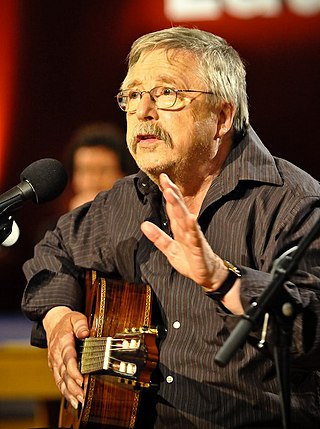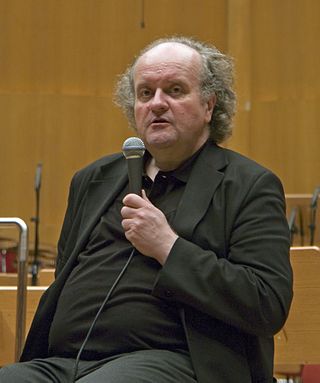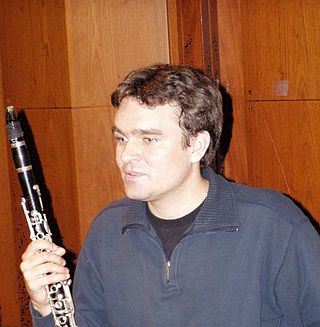Related Research Articles

Karl Wolf Biermann is a German singer-songwriter, poet, and former East German dissident. He is perhaps best known for the 1968 song "Ermutigung" and his expatriation from East Germany in 1976.

Wolfgang Rihm is a German composer and academic teacher. He is musical director of the Institute of New Music and Media at the University of Music Karlsruhe and has been composer in residence at the Lucerne Festival and the Salzburg Festival. He was honoured as Officier of the Ordre des Arts et des Lettres in 2001. His musical work includes more than 500 works. In 2012, The Guardian wrote: "enormous output and bewildering variety of styles and sounds".
Unsuk Chin is a South Korean composer of contemporary classical music, who is based in Berlin, Germany. Chin was self-taught piano from a young age and studied composition at Seoul National University as well as with György Ligeti at the Hochschule für Musik und Theater Hamburg.
Philipp Jarnach was a German composer of modern music, pianist, teacher, and conductor.
Kammersänger (male) or Kammersängerin (female), abbreviated Ks. or KS, is a German honorific title for distinguished singers of opera and classical music. It literally means "chamber singer". Historically, the title was bestowed by princes or kings, when it was styled Hofkammersänger(in), where hof refers to the royal court.

The Ernst von Siemens Music Prize is an annual music prize given by the Bayerische Akademie der Schönen Künste on behalf of the Ernst von Siemens Musikstiftung, established in 1972. The foundation was established by Ernst von Siemens (1903–1990) and promotes contemporary music. The prize honors a composer, performer, or musicologist who has made a distinguished contribution to the world of music. In addition to the main prize, other prizes are also given. The total prize money given is currently 3.5 million euros, with the winner of the main prize receiving €250,000. The prize is sometimes known as "the Nobel Prize of music".

Thomas Larcher is an Austrian composer and pianist.

Jörg Widmann is a German composer, conductor and clarinetist. In 2018, Widmann was the third most performed contemporary composer in the world. Formerly a clarinet and composition professor at the University of Music Freiburg, he is composition professor at the Barenboim–Said Akademie. His most important compositions are the two operas Babylon and Das Gesicht im Spiegel, an oratorio Arche, his string quartets and the concert overture Con brio. Widmann wrote musical tributes to Classical and Romantic composers. He was awarded the Bavarian Maximilian Order for Science and Art in 2018. He is the brother of a German classical violinist Carolin Widmann.

The Berliner Kunstpreis, officially Großer Berliner Kunstpreis, is a prize for the arts by the City of Berlin. It was first awarded in 1948 in several fields of art. Since 1971, it has been awarded by the Academy of Arts on behalf of the Senate of Berlin. Annually one of its six sections, fine arts, architecture, music, literature, performing arts and film and media arts, gives the great prize, endowed with €15,000, whereas the other five sections annually award prizes endowed with €5,000.
The Preis der Europäischen Kirchenmusik is a German music prize awarded annually since 1999 by the Schwäbisch Gmünd Festival Europäische Kirchenmusik. Awards are given to excellent composers and artists for achievements in the field of sacred music. The prize is endowed with €5,000.
The Brahms-Preis has been awarded by the Brahms Society of Schleswig-Holstein since 1988. The prize is furnished with 10,000 euros. It rewards artists who have contributed mesmerizing work for the preservation of the artistic heritage of Johannes Brahms.

Jan Philipp Fürchtegott Reemtsma is a German literary scholar, author, and patron who founded and was the long-term director of the Hamburg Institute for Social Research. Reemtsma lives and works mainly in Hamburg.
The Johannes Brahms Medal of Hamburg is a music award established in 1928, named after the composer Johannes Brahms who was born in Hamburg.
The international Paul Hindemith Prize promotes outstanding contemporary composers within the framework of the Schleswig-Holstein Music Festival (SHMF). The award commemorates the musical pedagogy of Paul Hindemith, who wrote the composition Plöner Musiktag in 1932 on behalf of the Staatliche Bildungsanstalt Plön. The music prize is endowed with €20,000 and goes together with a composition commission. The prize is presented annually by the Hindemith Foundation, the Walter and Käthe Busche Foundation, the Rudolf and Erika Koch Foundation, the Gerhard Trede Foundation, the Franz Wirth Memorial Trust and the Cultural Office of the Free and Hanseatic City of Hamburg since 1990. From 2010 to 2013, the winner was found by a composition competition. The work of the prize winner is to be premiered within the frame of the Schleswig-Holstein Music Festival.
The Bach Medal is awarded by the Lord Mayor of Leipzig during the Bachfest Leipzig in recognition of efforts to promote the work of Johann Sebastian Bach. The Bach Medal of the City of Leipzig is an annual award.
The Robert Schumann Prize for Poetry and Music Mainz is a classical music prize named after Robert Schumann, awarded biennially since 2012. The prize money is €15,000, donated by the Strecker Foundation, Mainz. The prize is awarded by the Akademie der Wissenschaften und der Literatur in Mainz, for "personalities with an outstanding lifetime achievement in the field of poetry and music".
The Robert Schumann Prize of the City of Zwickau is a classical music award. Since 1964 it has been awarded by the Lord Mayor of Zwickau. Robert Schumann was born in Zwickau. Between 1964 and 2002 the prize was awarded annually, since 2003 biennially. The award is given to outstanding singers, instrumentalists and ensembles as well as musicologists and musical institutions, who have rendered special service (sic) to cherishing and presenting Schumann’s musical and literary heritage as well as to the knowledge of his life and works. The prize is endowed with a total of €10,000. The winners receive a certificate and a bronze medal with the portrait of Schumann, created by the sculptor Gerhard Lichtenfeld.
Peter Ludwig Gülke is a German conductor and musicologist.
The Telemann Prize is an annual classical music award for special achievements in interpretation, research and cultivation of the life and work of Georg Philipp Telemann.
The Prize of the Christoph and Stephan Kaske Foundation is an annual award for promotion of new music. It was founded in 1988 by Karlheinz and Christiane Kaske in memory of their sons Christoph and Stephan. The Christoph and Stephan Kaske Foundation has its legal seat in Munich. The aim is to promote young, promising interpreters and composers in the field of new music. The award is endowed with € 10,000. The selection of the winner is made by a board of trustees. The prize is awarded in a ceremony at the Künstlerhaus am Lenbachplatz.
References
- ↑ "Bach-Preis der Freien und Hansestadt Hamburg". Online-Ausgabe des Handbuchs der Kulturpreise (in German). 2013. Retrieved 31 July 2018.
- ↑ "Der Hamburger Bach-Preis wird alle vier Jahre vergeben". hamburg.de (in German). 1 January 1970. Retrieved 24 October 2020.
- ↑ "Sofia Gubaidulina erhält Hamburger Bach-Preis". Der Tagesspiegel (Press release) (in German). Berlin. dpa. 19 January 2007. Retrieved 31 July 2018.
- ↑ "Komponist Pierre Boulez erhält Hamburger Bach-Preis 2015". neue musikzeitung (Press release) (in German). Regensburg. dpa. 26 February 2015. Retrieved 31 July 2018.
- ↑ Isermann, Enno (20 February 2019). "Komponistin Unsuk Chin wird mit dem Hamburger Bach-Preis 2019 ausgezeichnet" (Press release) (in German). Hamburg – Behörde für Kultur und Medien. Retrieved 20 February 2019.
- ↑ "Hamburger Bach-Preis geht an koreanische Komponistin Unsuk Chin". neue musikzeitung (in German). Regensburg. dpa. 26 November 2019. Retrieved 30 November 2019.
- ↑ "Zwei große Ehrungen an einem Abend in der Elbphilharmonie". hamburg.de (in German). Retrieved 1 May 2023.